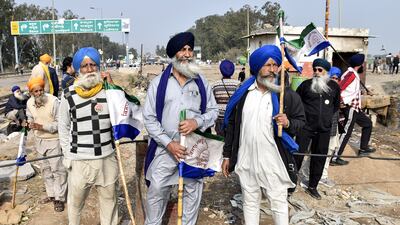Farmers in India will resume their march to New Delhi on Wednesday, increasing pressure on Prime Minister Narendra Modi’s government to ensure higher prices for their crops.
Thousands of farmers from Punjab and Haryana, where 60 per cent of India's wheat is produced, started the march towards the capital last week, calling for a law that guarantees a minimum support price for crops.
But they were stopped about 200 kilometres from Delhi by police and paramilitaries and blocked a motorway.
The police had put up barricades, concrete blocks, concertina wire and iron nails to prevent the protesters from moving towards to the capital.
Farmers' leaders held talks with the government on Monday but decided to resume their march after the meeting failed to reach an agreement.
The government proposed buying pulses, maize and cotton at guaranteed prices through co-operatives for five years.
Farmers, however, want minimum support prices for 23 crops. Leaders said the government’s offer was not in the interest of producers.
“The government has given us a proposal so that we backtrack from our original demands. The government will be responsible for whatever happens now,” said Sarvan Singh Pandher, general secretary of Punjab Kisan Mazdoor Sangharsh Committee, one of the unions.
The farmers also urged the government to allow them to march towards Delhi.
“The intention of the government was very clear that they would not let us enter Delhi at any cost. If you don't want to find a solution through discussion with farmers, then we should be allowed to march towards Delhi,” Mr Pandher said.


